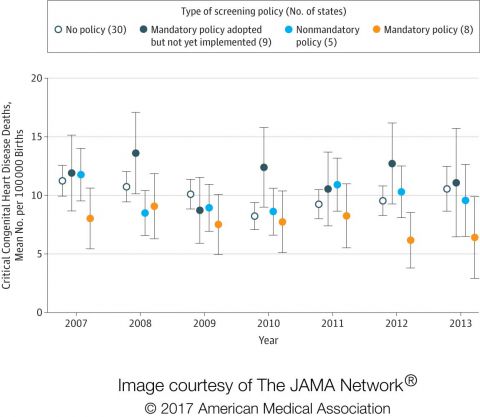
According to a new study by Rahi Abouk, PhD, William Paterson University, and colleagues, statewide implementation of mandatory policies to screen newborns for the most serious congenital heart defects was associated with an estimated decrease in infant cardiac deaths. Congenital heart disease accounted for 6 percent of U.S. infant deaths from 1999 to 2006. In 2011, critical congenital heart disease was added to the U.S. Recommended Uniform Screening Panel for newborns. The study explored whether the policy requiring screening for the most serious defects is associated with lower infant death rates.
Researchers conducted a before-after comparison of early infant deaths (between 24 hours and 6 months of age) among infants born between 2007 and 2013 from critical congenital heart disease or other congenital cardiac causes in states with mandatory vs. non-mandatory screening policies. As of June 2013, eight states had implemented mandatory screening policies, five states had voluntary screening policies, and nine states had adopted, but not yet implemented mandates.
Authors found there was a decrease in estimated infant cardiac death rates for states that implemented mandatory screening policies compared to states that did not. Although estimates of death rates were imprecise because of the small number of deaths and the small number of states with fully implemented screening mandates, the authors state the findings nevertheless support the use of statewide policies requiring newborn critical congenital heart disease screening as one means to reduce U.S. infant mortality.
Read journal article and a related editorial here.
SOURCE: Journal of American Medical Association
